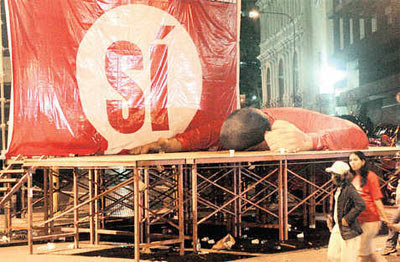I’d say this is good news except that I have zero confidence that the referendum will result in anything other than what Chavez wants (i.e. dictatorial control):
Venezuelan President Hugo Chavez has lost his lead eight days before a referendum on ending his term limit, an independent pollster said on Saturday, in a swing in voter sentiment against the Cuba ally.
Forty-nine percent of likely voters oppose Chavez’s proposed raft of constitutional changes to expand his powers, compared with 39 percent in favor, a survey by respected pollster Datanalisis showed.
Just weeks ago, Chavez had a 10-point lead for his proposed changes in the OPEC nation that must be approved in a referendum, the polling company said.
(See a round up of the various polls here). That was five days ago, however. Today, Reuters reports that Chavez is experiencing a surge of support:
Venezuelan President Hugo Chavez has at least a seven-point lead for a referendum on Sunday on reforms that would allow him to run for re-election indefinitely, according to a poll distributed on Wednesday.
[...]
The survey of 1,600 voters taken November 21-27 said 56 percent of likely voters appeared set to vote for Chavez’s constitutional overhaul and 40 percent set to vote against.
But when the survey measured how undecided voters would cast their ballots and also took into account that others, who do not yet plan to vote, could decide to participate, the difference narrowed to as little as seven points.
Ah, but let’s see who conducted this latest poll:
The poll by Consultores 30.11, which has worked for the government and accurately predicted a vote result last year, showed Chavez moving ahead compared to most surveys in recent days that put him at best in a statistical tie.
Yeah, I’ll bet they did. Reuters is being coy here. Consultores 30.11 apparently works solely for the Venezuelan government and puts out polls (sometimes through the U.S. polling firm Evans/McDonough, Inc.) that have a decidedly pro-Chavista flair. It’s no wonder they accurately predict elections when the numbers are handed to them by Chavez himself. The firm does not seem to be anything more than a PR machine for Chavez.
Of course, considering how Chavez is dealing with opposition to his referendum, it’s no wonder he needs the PR help (HT: Jim Hoft):
Several media outlets in Caracas have reported today that the new protests where thousands of students from all over the country participated against Chavez’s Constitutional “reforms,” left many students wounded. There were violent confrontations with the police in many Universities and there are reports of protesters having bullet and pellet wounds. Allegedly, one is in critical condition. Some newspapers have published news that many students have been detained by the authorities.
Demonstrations also occurred in other cities: Maracay, Valencia, Yaracuy and Puerto La Cruz and there is information that many professors joined their students. For this Sunday, all the student leaders will join their forces and will march in a huge demonstration to reject Chavez’s plans to turn Venezuela into an oppressive and tyrannical country.
Daniel at Venezuela News and Views has much more. Also, see this Luis Fleischman piece posted by Fausta:
What we are facing now is probably the largest civil protests in Venezuela since February 2003 when groups in civil society were struggling to hold a re-call referendum on Chavez….
This new anti-Chavez movement has been brought about by one man. He is the former Chavez Defense Secretary; General Rafael Baduel. Baduel has publicly opposed the constitutional reforms in Venezuela calling them an attempt at a “coup d’etat. As a result he has become the new de-facto leader millions of Venezuelans were waiting for. Until recently, Baduel could be blamed for allowing Chavez to co-opt the military in Venezuela and use it to strengthen his regime and for loyalty to a man who spoke about installing a socialist, revolutionary regime backed by the military. Yet, it is the same Baduel that now begins to rebel.
RTWT.
And while I have serious doubts that Chavez will lose, a prominent opposition group seems to be emboldened by the numerous protests around the country:
Comando Nacional de la Resistencia, a Venezuelan opposition group that President Hugo Chavez accuses of plotting his ouster, reversed its call to abstain from a referendum on a new constitution.
The CNR, in a statement posted to its Web site, said a massive voter turnout would defeat the Dec. 2 initiative to approve 69 changes to the constitution enlarging Chavez’s power. Abstention will increase chances of its passage, local pollster Datanalisis said this month.
“We invite voters to go to the polls with their eyes wide open,” Antonio Ledezma, one of the CNR leaders, from Caracas, said in the statement. “The victory of the `No’ to the reform proposal is our main goal. We must back it.”
Strangely, despite the fact Chavez’s totalitarian tendencies and Messianic-Bolivarian fatalism is costing him friends both at home, and in his neighborhood, and regardless of the thuggish tactics being used to shove his socialist utopia down the throats of his serfs citizen, the little dictator is still quite popular amongst the Left:
Why so much hatred (for Chavez)? Because at the same time social-democracy is undergoing an identity crisis in Europe, historic circumstances seem to have confided the responsibility of taking the lead at an international level in the reinvention of the Left to Mr. Chávez. While on the Old Continent, European reconstruction has had the effect of making any alternative to neo-liberalism practically impossible, in Brazil, in Argentina, in Bolivia and in Ecuador, inspired by the Venezuelan example, experiments that keep the hope of realizing the emancipation of the humblest alive continue to succeed one another.
In this respect, Mr. Chávez’s record is spectacular. We can understand how he has become the required benchmark in dozens of poor countries. In his scrupulous respect for democracy and all its freedoms [!], has he not re-founded the Venezuelan nation on a brand new basis, legitimated by a new Constitution [!] that guarantees popular involvement in social change? Has he not rendered their dignity as citizens to some five million marginalized people (including the indigenous people) deprived of identity papers? Has he not taken back in hand the public company Petróleos de Venezuela SA (PDVSA)? Has he not de-privatized the country’s principal telecommunications company as well as the Caracas electricity company and returned them to serving the public? Has he not nationalized the Orinoco oil fields? Finally, has he not devoted a share of oil rents to acquiring effective autonomy vis-à-vis international financial institutions as well as autonomy for the financing of social programs?
The quote above, and the emphasis in it, comes courtesy of Bird Dog who retorts:
Ah, government trying to run businesses! How quaintly 19th Century! How idealistic! How caring! It’s “for the people”! Kinda like Hillary Clinton on the US oil companies: “I am going to take those profits…” Indeed, there is no greed in the business world that can compare with government greed for money and power.
Chavez’ “progress, ” however, includes no food on the supermarket shelves. While I do not have the same trust in Venezuela’s voting as Jimmy Carter does, it remains a fact that dictatorship by popular vote, and tyranny by popular vote, has a long history.
Venezuela will become a totalitarian state in short order, to the extent it is not already one. Make no mistake that this referendum, whatever the outcome, will do anything to slow that march down. By hook or by crook, Chavez will create his socialist utopia, and he will likely murder hundreds of thousands in the process if history is any guide. All of this is a given, and we should drop the pretense of there being any hope that Venezuela will right itself before plunging into a totalitarian hellhole.
The only real question is whether the usual suspects will continue to cheer Chavez’s descent into Bolivarian madness as they have done for Castro. Or whether they will blatantly ignore the devastating results Chavez’s socialist policies for the Venezuelan people as they did for Stalin. Or, once it becomes clear that Chavez is a megalomaniac who can’t be trusted and intends to use his subjects for his own glorification, whether they will promptly forget about him like that crazy uncle you pretend you don’t have, just as they have done with Kim il Jong.
In the end, there will still be a socialist dictator destroying the lives of millions of people, and the Left will cry “that’s not socialism; if only the right people had been in charge.”
Spare me. Spare Venezuela. And spare the victims of the next leftist hero with a five year plan “for the people.”
Technorati Tags: Chavez, Venezuela, socialism, totalitarianism, referendum, protests, police brutality, Castro, Stalin, communism, Bolivarian, revolution, dictator
Sphere: Related Content

 McQ points us
McQ points us In the wake of the Venezuelan electorate issuing Hugo Chavez a defeat (his first) at the ballot box last week, there was
In the wake of the Venezuelan electorate issuing Hugo Chavez a defeat (his first) at the ballot box last week, there was 



 Sometimes folks truth is way weirder than fiction. In the case of Hugo Chavez clownish doesn’t come close to describing him.
Sometimes folks truth is way weirder than fiction. In the case of Hugo Chavez clownish doesn’t come close to describing him. Unable to “command” the economy to do what he wishes, in a pattern predicted here months ago, Hugo Chavez reacts as all dictators do, keeps moving to seize even more power to try and make his plans work. Wage and price controls don;t control inflation as desired, nationalize more industries, seize land, insist on greater propaganda efforts and apply the threats more comprehensively. Recent moves include threatening to
Unable to “command” the economy to do what he wishes, in a pattern predicted here months ago, Hugo Chavez reacts as all dictators do, keeps moving to seize even more power to try and make his plans work. Wage and price controls don;t control inflation as desired, nationalize more industries, seize land, insist on greater propaganda efforts and apply the threats more comprehensively. Recent moves include threatening to 




